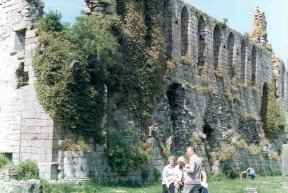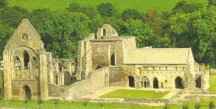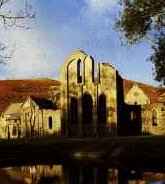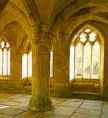This
page is part of
COLLECTING
BOOKS and MAGAZINES,
Blue Mountains, Australia
SERVING COLLECTORS SINCE JULY, 1997
After reading of Val’s travels in the Spring 1994 issue of the Abbey Guardian in
which she told us Fountains Abbey was her favourite, I began to think which Abbey is my
favourite. Earlier in the year I had a card from Ann Mackie-Hunter in which she told me
Glastonbury Abbey was her favourite; I began to think - yes - I found both of these
fascinating but I have two favourites, Valle Crucis Abbey in North Wales and Jervaulx
Abbey in Yorkshire.
Jervaulx Abbey
We visited it on a bright early Spring morning; there was not a soul around and they
did not even have anyone on the gate, just an honesty box for the entry fee, and some
books and cards. We parked on the opposite side of the narrow winding lane (the B6108) in
a small parking area, then followed the path across the meadow with its many cows, to the
abbey which is still privately owned.
| I did read later that English Heritage are going to assist in some
restoration work. It is set in a wild flower garden and many of the flowers were coming
into bloom. There were many wallflowers in the cracks and corners, and they brought to
mind Jen who at times carried wallflowers, and her visit from Phyl when she asked Jen if
she minded her being the wallflower queen. |
 |
Because little restoration work has been done, the whole abbey reminded me of Grace
Dieu as EJO must have visualised it before sir Antony restored it and before the Shirleys
lived in it as caretakers.
Jervaulx abbey was a Cistercian abbey and dates back to 1156 when it was founded by monks
from Byland Abbey, and is in the Valley of Ure or Yorvale but this was changed to Jervaulx
(French). It was so peaceful just to wander among the ruins with the wallflowers, wild
roses and many other flowers.
On the day we visited Jervaulx we also visited Fountains abbey. Such a contrast: Fountains
is a very large Cistercian abbey and there were many people visiting. It has a beautiful
undercroft and the remains of the church were wonderful.
Valle Crucis Abbey
This abbey too we visited on a beautiful Spring morning with all the trees coming into
leaf and the grass bright green after the winter. No honesty box here, but a small
collector's booth, and because we were the first visitors of the day, the custodian spent
some time talking to us about the abbey. He then left us to wander through the ruins.
Valle Crucis Abbey lies 2.5 km. To the north of Llangollen, just off the A542 road. It
too is a Cistercian abbey and was built to the uniform plan. It was begun in 1200 by monks
from Strata Marcella. Forty years after it was founded it had a fire which destroyed much
of it. Then again it was badly damaged in the wars at the time of King Edward the First.
After the dissolution in 1536, some of the buildings were used as a dwelling and at times
as a farm.
One enters the church through the west front with its fine rose window divided by delicate
tracery with eight sections. We spent some time looking at the inside of the abbey before
walking outside to see the fish pond, said to be the only surviving monastic fish pond in
Wales.
I can hear you all asking, didn’t you visit Cleeve? The answer is yes, but we picked
the time when the BBC were filming ‘Maid Marion’ for TV. They had erected
scaffolding in many places as well as several false walls. This spoilt it a little, but
makes a good excuse to visit again.
* This article first appeared in ‘The Abbey Guardian’, December 1994 issue.)
Back to main
Abbey page and index of EJO items.
Back
to Collecting Books & Magazines.



